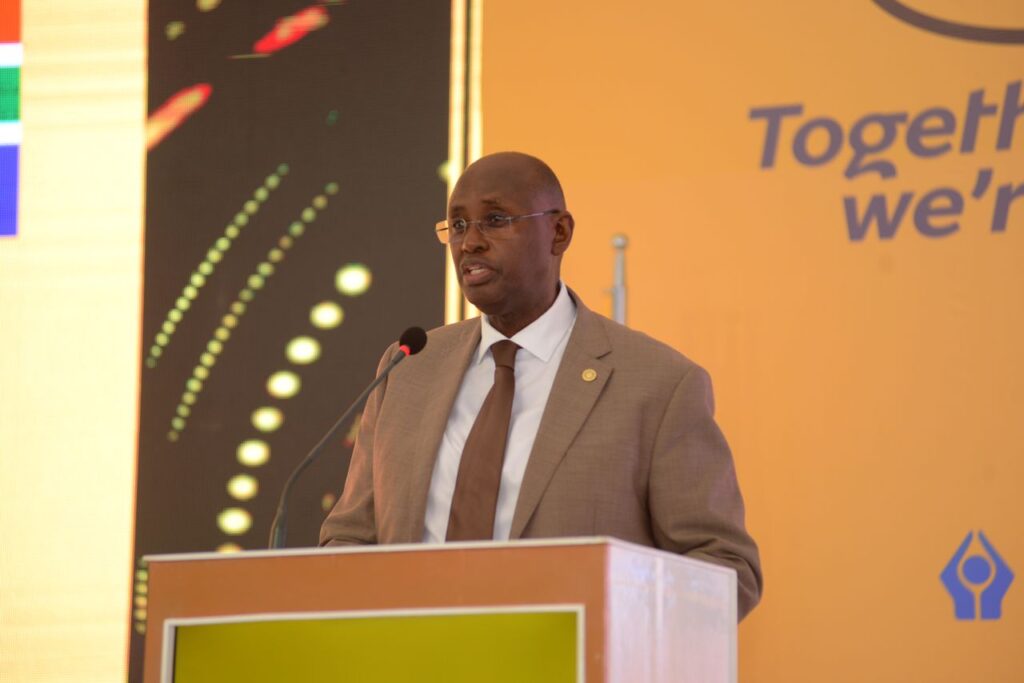[ad_1]
The Private Sector Foundation Uganda (PSFU) Chairman Board of Directors, Humphrey Nzeyi has called for the harmonization of Uganda and South Africa Standards Bureaus as a means of facilitating seamless and profitable trade between the two countries.
Nzeyi made these remarks at the ongoing Uganda South Africa Business and Trade Summit currently underway at Speke Resort, Munyonyo.
He noted that the discussions for the standards began earlier this year, on the sidelines of the South Africa-Uganda Business Summit, adding, “We are optimistic that further strides in this direction will be taken during this summit.”
He stated that the potential of Africa, particularly Uganda and South Africa, is boundless, calling for collaboration, partnerships, and joint ventures that will unlock opportunities for the rapidly growing youthful population and strengthen both economies.
“Uganda, and its people in particular, are open for business. In 2021, Ugandans were voted as the happiest people in the East African Community, ranking 83rd globally (World Happiness Report 2021),” he said.
Adding, “The purpose of our meeting again here in Uganda is to further strengthen those ties and to bring greater synergy between our two great nations.”
In February of this year, South Africa hosted the Uganda South Africa Business Summit, this was attended by the two Presidents.
According to Nzeyi, over 70 South African companies in Uganda, have collectively invested over USD $2.4 billion in the economy.
The total value of Uganda’s exports to South Africa currently stands at US$20.7 million, while South Africa’s exports to Uganda are valued at US$187 million.
Nzeyi noted that there exists untapped potential to triple these trade values through strategic partnerships and joint ventures.
Uganda’s key imports from South Africa encompass electronic and electrical equipment, motor vehicles, and machinery, collectively valued at US$46.4 million.
In contrast, Uganda’s principal exports to South Africa encompass Packaged Medicaments ($13.1 million), Coffee ($2.88 million), and Raw Tobacco ($1.28 million).
He noted that with Uganda’s robust coffee production, there is substantial scope for investment in coffee value addition and an increase in coffee imports from Uganda tenfold.
Leading a high-powered delegation from the government of South Africa, Hon. Angela Thokozile Didiza, the Minister of Agriculture, Land Reform and Rural Development, in her remarks called on African countries to collaborate to build back better following the impact of economic shocks like the Covid-19 pandemic and the shocks to the global chain as a result of the Russia Ukraine war.
“We foresee key opportunities to trade among each other reinforced by the Africa Free Continental Trade Area (AFCFTA) to achieve the vision of the Africa we want by 2063 and work together to exploit our rich African natural resources to take advantage of economic opportunities abounding within the African population which currently stands at a billion citizens and growing. Strengthening bilateral trade creates a solid basis for the AFCFTA,” she said.
Hon Bright Rwamirama, the Minister of State for Agriculture, Animal Fisheries and Industry noted that there is need to attract investors who can do value addition to Uganda’s rich agricultural commodities.

“According to our records, Uganda is the second largest producer of coffee in Africa and the number one exporter of coffee from Africa. In 2022, we earned approximately USD860 million from export of coffee. Compared to other coffee producing nations, revenues earned from our coffee exports remain low because of limited value addition. There is need to attract investors who can do value addition to Uganda’s rich agricultural commodities,” he said.
During a panel discussion, various Ugandan entrepreneurs pointed out the need for financial institutions to provide the required financing to explore greater trade opportunities.
Absa Bank Uganda committed to continuing to finance the opportunities in the sector providing financial solutions including working capital and trade financing.
“UGX12 trillion of total private sector lending across the sector is to agriculture reflecting the commitment to financing agriculture despite the associated risks. Our lending to agriculture continues to grow and currently taking up 10% of lending on our loan book. Lending to small scale farmers remains a challenge however we have embraced this challenge and found solutions to reduce the associated risks through various financial solutions including value chain financing which allows us to finance the entire agriculture eco-system. Trade and working capital finance are also viable financing options available to agriculture sector,” said Mumba Kalifungwa, Managing Director, Absa Bank Uganda.

Overall, the summit deliberations revealed the need to share best practice among players in the agriculture eco-system and have deliberate conversations targeted at finding unique African solutions towards addressing overarching issues such as quality and standards, enhancing agricultural productivity, inclusive growth to support growth of even small-scale farmers.
Key to the summit agenda to address the balance of trade between Uganda and South Africa is the need to nurture anchors for trade.
“Key to enhanced trade is the need to establish enabling policies and the need for the business community to understand policies and laws in each country that support trade and investment including land tenure, licensing, tax laws and other compliance matters that companies must adhere to. We also need to ensure that there is supporting infrastructure, financing, and mechanisms for conflict resolution and mediation to address mistrust and problems that may arise,” said Hon. Angela Thokozile Didiza.
The President of Uganda, H.E Yoweri Kaguta Museveni is expected to attend day two of the Summit which ends Today.
[ad_2]
Source link
